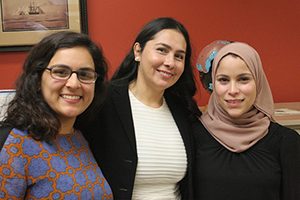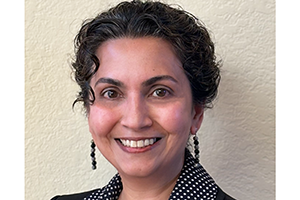When looking at the interplay of health, economic and security crises around the world, it isn’t difficult to recognize themes that vex smaller communities much closer to home.
That was the message of the three speakers at “Global Health & Peacebuilding: Global Influences in our Local Communities,” a wide-ranging discussion held at UWM on Feb. 13.
Providing the global perspective was Alaa Murabit, a Canadian physician and United Nations high-level commissioner on health employment and economic growth. Joining Murabit were Salma Abadin, violence prevention research coordinator with the Milwaukee Homicide Review Commission, and Tatiana Maida, Healthy Choices Department manager at the Sixteenth Street Community Health Centers.

Murabit used the recent Ebola crisis as an illustration of the complex interplay of health, economics and global security.
“More than 43 governments closed their border to the affected countries as a consequence of the Ebola epidemic, which has led to the decimation of their economies three years in a row,” Murabit said, “and we don’t see it changing over the next six or seven years. That economic decimation has led to more violence internally, more aggression toward the government, less media accountability.
“So it’s time we started to talk about health as a necessity for global security.”
Abadin pointed to similar complexities on a local level, particularly in the context of the health concerns arising from “food deserts” in some parts of Milwaukee and other communities.
“The Milwaukee community is saying that access to healthy foods is second only to violent crime as a concern,” she said. And there’s a connection: “We see kids joining gangs because that is a way to provide food for their families.”
Maida stressed the need to have a more robust notion of community engagement in health policy, one that involves community members directly in the planning process.
“Organizations, often with the best intentions, reach out to communities looking for feedback: ‘We’re going to show you this plan that we have and we need your approval,’” she observed.
“That’s not community engagement. We need the people from the streets on the boards of these organizations. We need to a find a way to develop leadership on the community level so that we can use the potential there.”
For Murabit, the global analog of grassroots participation was the need to recognize the value of solutions being developed around the world. She suggested American activists had much to learn from their counterparts abroad.
“Traditionally, when American civil society activists get involved internationally, they don’t join U.N. Development Program or UNICEF or the U.N. Population Fund,” she said. “They work in the State Department and USAID. But those may not be the best vehicles anymore.
“Utilize the multilateral system, take advantage of that system, because it exists for that purpose.”
The event was sponsored by the Master of Sustainable Peacebuilding program, the UWM Institute of World Affairs, the Center for International Health, the College of Nursing and the Medical College of Wisconsin.



